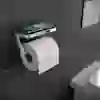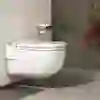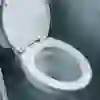Share:
When you’ve created your dream bathroom, you’ll want to be sure that it both looks and functions superbly for many years. Perhaps one of the fixtures from our bathroom suites that's regularly put through its paces is the toilet. So, with such an important role to play, it’s a good idea to ensure that everyone understands what can and can’t be flushed down the toilet.
Yet, often the most common cause of toilet blockages are caused by flushing the wrong stuff. Not only is this a huge inconvenience for all users, and a potentially costly one, but by flushing the wrong things down our toilets we also create a wider environmental problem.
Fortunately, it’s quite easy to know what to flush and what not to flush. Here The Bathroom Showroom explains in a little more detail.

What Can You Flush Down a Toilet?
Perhaps one of the simplest of questions is what are the things that you can actually flush down a toilet? This is because the answer is merely in the 3 P rule. That is, only poo, pee, and toilet paper can be flushed down the toilet!
Poo, pee, and toilet paper are all that any of us should ever be flushing down our toilets. Toilet paper is designed to disperse when it comes into contact with our toilet water. Therefore, it will break down and not linger, flushing easily as it makes its way to the sewer.
So, by adhering to the 3 P rule we can ensure that our toilets and drains remain in good working order long term and we play our part in protecting the wider environment.
And yet, drainage and sewerage experts are continually called out to instances whereby they repeatedly find the most common of problematic items have been flushed therefore requiring outside assistance to clear them. Not only does this cost the homeowner, but a blocked toilet and drain are not the nicest of occurrences for members of the home to have to deal with.

The Most Problematic Things People Incorrectly Flush Down The Toilet
Unfortunately, there remain several common culprits that people continue to incorrectly flush down the toilet. But, none of these items should ever be placed into your toilet, including:
Wipes - Whether baby wipes or makeup wipes, these completely unfriendly products are one of the UK's biggest issues when it comes to blocked toilets and, more so, sewage blockages. Plumbing professionals also want us to steer clear of those wipes that claim to be flushable as well - because they simply aren’t!
Wipes are made up of non-woven materials and plastic fibres. This makeup ensures that they can't break down or disintegrate when placed into water. So, when wipes are flushed down the toilet they remain intact and do not flow through freely. Instead, they get caught in the pipes, accumulate, and then start to catch all the waste that comes after, resulting in clogging throughout the sewer system.

Dental floss - Though it may seem such a minuscule addition, dental floss can have a tremendous effect when clogging a toilet system and sewer. Floss is made of nylon or Teflon meaning it will not break down. Instead, when it's left to build up, it starts to combine and wrap itself around other waste present and help clog the system.
Cotton wool balls and cotton wool buds - Again, these things may look small and innocent but when flushed down the toilet, cotton wool simply does not break down. Instead, it builds up and traps other waste matter, forming a blockage in the system.
Sanitary towels, tampons, and nappies - Many people believe that ripping sanitary products and nappies up into small pieces, means they can be flushed with ease. But this is totally incorrect. Sanitary ware and nappies are designed to absorb large amounts of water. So, when they’re flushed and remain in water they'll ultimately expand in the systems and swell. As they swell up they begin to create a blockage and cause the water to overflow.
Paper towels - When some people run out of toilet tissue, they turn to paper towels. Yet, paper towels aren’t designed to break up easily but rather to absorb water. Therefore, like sanitary ware and nappies, they will start to expand in the system and sewer and cause blockages.
Hair - Some people think nothing of cleaning those big clumps of accumulated hair from their brush and putting it straight into the toilet to get rid of it. Yet, hair will stick to the pipes when flushed and build up, clogging the system, in the same way as dental floss does.
Keep Your Toilet Functioning Correctly
One of the best ways of keeping your toilet clear and preventing potential blockages is to place a bin near it. This is a simple solution that ensures all the items mentioned above that should never be flushed can be disposed of correctly and safely. This way you also help your neighbours and the wider environment by keeping the sewerage free of harmful products.
For more bathroom ideas and bathroom inspiration, take a look at our Rest and Relaxation blog section.